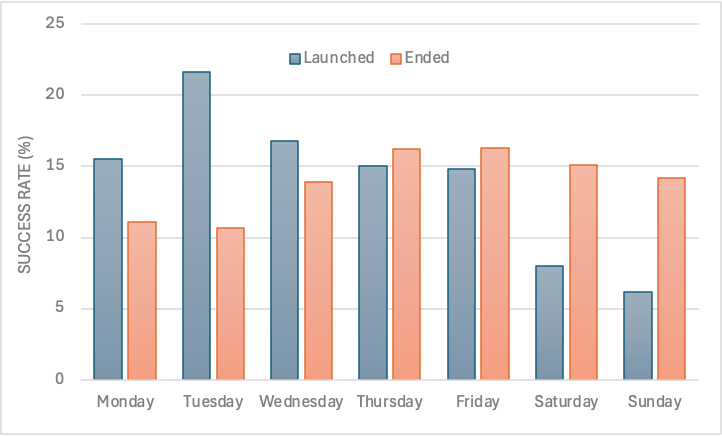When should you launch/end your Kickstarter?
Analysis shows the launch and end day of a campaign do matter, and there are two optimal strategies to pursue.
Hi friends,
It’s a busy weekend here with Free Comic Book Day (FCBD) on May 3, Star Wars Day on May 4, and Virtual Creator Con overlapping them both!
As you can imagine, I don’t have a lot of bandwidth to write a more comprehensive post, so this week’s newsletter will be a short one. I hope you’ll check out the panels, interviews, and artist alley at the con, and feel free to reach out here to let me know what’s working for you (and what isn’t).

Some of you reading this are likely also following
and reading his daily data reports on the comics Kickstarter landscape, which is invaluable reading - so if you’re not following and reading, head to his publication(s) immediately.One of the interesting things he discusses is the prevalence of Tuesdays as a favoured launch date. I touched upon this in an older post about the discovery of a Blue Monday effect in reward-based crowdfunding.
But I read a very recent paper “The weekend effect on rewards-based crowdfunding”1 which corroborates the Tuesday launch strategy, during their investigation into the weekend effect.
In brief, the authors of this paper examined data from 319,000 projects on Kickstarter between 2009 and 2022, focusing on success rates and day of launch to better understand temporal effects.
The above figure uses their data, but shows the success rates across all 319,000 campaigns for projects launched on a given day (blue) and those that ended on a given day (orange).
The descriptive statistics show Tuesday’s success rate (21.6%) was much higher than the other days, and there was a general decrease in success rates as projects launched on successive days - with weekend launches having the lowest success rates. Conversely, campaigns ending on a Friday had the highest success rates (16.3%), while Tuesday had the lowest success rate.
Going beyond descriptive statistics, the authors used a mixed effects logistic regression model to analyze the data, adjusting for the following factors: log-transformed campaign goal size, the campaign category, the launch year, whether the project was staff-picked, and the project owner’s U.S. location.
Relative to a Monday (taken as the baseline), Tuesday launches had a 26% higher success rate, Wednesday launches had a 6% higher success rate, while Thursday launches were about the same. Friday, Saturday, and Sunday launches actually had lower success rates (5%, 15%, and 16% respectively).
On average, however, projects launched on weekends are 19% less likely to achieve funding success compared to those launched on weekdays, which is a statistically significant finding.
After validating these findings, the authors also looked at the day the campaign ended using a similar analysis.
The authors found that campaigns ending on a weekend have an 11% reduction in the likelihood of success. However, there is a powerful interaction effect between start and ends days of a campaign, which mitigates the negative impacts for weekend launches when they also end on a weekend. The data shows the likelihood of success is around 9% in these cases, which actually makes them more likely to succeed than campaigns that start/end on a weekday.
Campaigns that start on a weekend have average lower odds of success of 28% compared to weekday launches, while campaigns that end on the weekend have average lower odds of success of 16% compared to weekday endings.
Thus, the findings can be summarized as follows: if you launch on a weekday, end on a weekday; while if you launch on a weekend, make sure you end on a weekend. That way you optimize your chances of success, as shown in the figure below.
The paper further suggests that holidays are exceptions, with launches on holidays having a 7% higher probability of success than an average Monday! This is an unexpected finding, and one that deserves more investigation.
While this is a very (very) shallow overview of the paper, there is a lot in this paper for creators to digest, and it’s worth digging into their model in more detail. What the paper lacks is an explanation of these findings. While the regression shows Tuesdays are the most successful launch day, there is still no psychological explanation of this - other than it’s the day after Monday (and maybe that’s enough).
For many people, Fridays are pay-days, so it may be that people get paid and decide to back a project on its last day, which makes it a success. Is this the reason for why campaigns that end on a Friday are more successful? Or is it the proximity to the weekend, when people feel they’re going to be offline?
Still a lot of questions to address on this topic, but my takeaways are:
The optimal strategy would be to launch on Tuesdays and end on Fridays (which is the strategy I have been pursing).
If you have to launch our campaign on a weekend, make sure the campaign also ends on a weekend.
Let me know what you think about this. Does this agree with your expectations?
While we’re still on the topic of weekends, why not tell me how yours is going.
Until next week.
John
Humoud Alsabah, Abdullah I. Alibrahim, The weekend effect on rewards-based crowdfunding, Journal of Engineering Research, 2025, ISSN 2307-1877, https://doi.org/10.1016/j.jer.2025.04.005.







Thanks for the mention, John! Fascinating crowdfunding phenomena with real consequences and application.